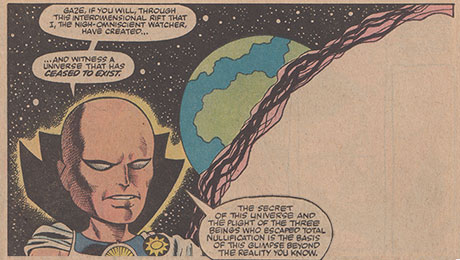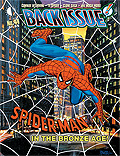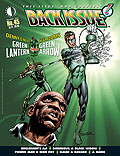 Doug: Today you'll need to put on your "thinking cap" (how many of you ever watched a kiddie program called Romper Room?) and wipe away some years. I want you to journey back in your mind to the time when you were a 6-, 7-, or 8-year old comic reader; hopefully I didn't disqualify too much of our audience. If I did, feel free to circumvent my scenario. Anyway, here's what I'd like to find out from you today -- as a child, what was your perception of violence and destruction in comics?
Doug: Today you'll need to put on your "thinking cap" (how many of you ever watched a kiddie program called Romper Room?) and wipe away some years. I want you to journey back in your mind to the time when you were a 6-, 7-, or 8-year old comic reader; hopefully I didn't disqualify too much of our audience. If I did, feel free to circumvent my scenario. Anyway, here's what I'd like to find out from you today -- as a child, what was your perception of violence and destruction in comics?Doug: To be quite honest, I guess I never gave it a second thought. I don't think I had any perception of death or debilitating injury since the same heroes appeared in the next issue. As to bad guys, I'm thinking it was out-of-sight-out-of-mind until they returned again. Concerning property damage, and this may sound shallow or naive... until the 1989 mini-series Damage Control (which I've never read, but fully understand the farcical premise) I don't think it ever occurred to me because the Baxter Building and Avengers Mansion almost always looked the same from tale to tale. Below is a page from Marvels; how long do you think it took the Big Apple to dry out from this attack??
Doug: Of course, the first time I laid my eyes on Amazing Spider-Man #122 (a few years after its publication -- and ASM #90 was way before my time), my concept of death was forever altered; ditto with X-Men #95. In those stories, and afterward, it was apparent that death in comic books was real, that characters' lives could be affected, and that future storylines would be influenced by dark events of the past.
Doug: When you read comics now (old or new), do you get any sense of the amount of property damage or potential loss of life that takes place? I thought that the first volume of The Ultimates addressed these issues; I'm sure other modern comics have done so as well. When did your personal Age of Innocence end, and was there a definitive moment that led to your awakening or maturation?




















































14 comments:
i have given this a lot of thought over the years and I had an impression that no matter how many times you beat the badguy,they would keep coming back...
this has given me an irrational fear of repercussions!
just sayin'
i also do believe that like probably all of published content is propaganda,including our beloved comic books
The wonderful magic of quality-written and drawn comics is providing the story proper pauses and pacing. It also sucks the reader in to the emotions displayed by the protagonists.
After decades of world disasters shown in comics, the ones that leave a mark are still the smaller events, such as the Avengers Mansion Siege (Buscema/Stern), Gwen's and Swordsman's death, Reed given divorce papers in FF 147, Bronze events like that.
On a larger scale, Trigon's world destruction in the New Titans first 'deluxe format' story arc was pretty potent.
Doug, once again, a fascinating topic.
To answer your final question - when did my age of innocence end? - I think for me, when we're talking comics, the answer is "NEVER".
I'm getting back into silver and bronze age comics a bit because the "reality" for me is in the characterization and the soap opera like aspect of the stories combined with the action. But, the violence and death are watered down, clean. Never cared for the dark, grim stuff that came later.
I remember the first time I picked up Marvels in a bookstore. I was intrigued by the idea and as an adult my thought was if these guys were real I sure as hell wouldn't raise a family anywhere near New York.
Tom
For me, I have to say that "end of innocence" moment, or the first time I was completely emotionally shocked by something I read in a comic book was X-men #137 - the death of Phoenix. I was about 12 at the time, 'sophisticated' enough to fully understand the story, but still enough of a little kid to be shocked by it all (and also not wise enough to clue in on all the foreshadowing from that and previous issues, as well as the fact that the cover itself sported the title "Phoenix Must Die!"). Nothing in comics fazed me after that...
Edo, nice comments on "end of innocence" moment.
If I think of today's subject as that, I can think of both Gwen's death and her first re-appearance as a clone, which really closed a lot of my invested emotions into the MU.
While understanding Stan's decision made behind the scenes, the clone story arc was a dumb decision adding nothing long-term past the weird initial shock value, IMHO.
I also think of the Shooter Yellowjacket storyline, but it's more a disappointment than anything else.
I never really thought about life, death and destruction much because comic book characters never seemed to die and everything was rebuilt by the next issue. Heroes and villians always returned, no matter how improbably. I was smart enough to know that this was fiction, but as a kid I just never gave it much thought.
The comic that first really made me think of this was Crisis On Infinite Earths #1. The story begins, if you recall, with the destruction of Earth-3 and everyone on it. It was the first story I had ever read involving the Crime Syndicate so I didn't have much invested in them. Still, I got the point that they were supposed to be parallel earth analogs of the Justice League and Lex Luthor.
Over the course of a few pages, the former villians futilely attempt to save their world from a wall of anti-matter destroying everything. Some fight on defiantly, others paassively accept destruction, all while trying in some way to come to terms in what little time they have remaining with lives that they wasted on selfish, villianous pursuits.
Meanwhile, Luthor uses the final moments to send his son into aother dimension and kiss his wife Lois Lane goodbye. It was clear from the context that all of this was meant to be final and irrevocable.
Those pages really affected me as a 13-year-old kid. It was the first time I could remember that a comic made a point about mortality and making the most of the limited time we have on this earth.
I was 9 when X-men 137 came out, so that was my introduction to death in comics.
I honestly didn't understand that Phoenix was "dead" until I'd read it 2-3 times. I remember thinking "where's the body?". But I generally don't take comic book deaths seriously, with the exception of Scourge's victims. I don't think Birdman and Mirage will be coming back anytime soon.
As for "destruction", one of the first times I thought of this was the death of Capt. George Stacey , way before my time too, but I read the Marvel Tales reprint. The next time I gave any thought to destruction was the 1980s series Damage Control. If you don't remember it, it was about a company that specialized in repairing & cleaning up sites damaged by superhero/villain battles. I don't generally recommend late-80s comics, but it was a funny story by the late,great Dwayane McDuffie. I recently re-read it, holds up pretty well.
Sorry for the digression, but this topic reminds me of a childhood friend who always believed characters were dead. I recall conversations like "Did you get X-men 155 yet? Colossus dies!"
When we'd play with Mego dolls, I'd want to use the Joker, he'd say, "No. The Joker's dead. He and Batman were fighting on the Jokerplane and it crashed, Batman found a piece of Joker's tie. So you can't use the Joker doll. And no, you can't use Green Goblin either. Norman's dead, Harry's cured."
Strict adherence to "continuity" is no fun when you're a kid. It always bugged me, I never believed comic book deaths.
Well chosen topic today! As I start my time machine and return to my childhood, I recall just recently graduating to superhero comics from Casper and Richie Rich. Superman was my first 'grown up title'; and has been noted by otheres, I quickly saw that most changes didn't hold from issue to issue.
Soon I was introduced to Marvel, and those Spiderman stories seemed a world apart from the DC books of 1968. Superman seemed simply to occupy the pages of each story, serving his purpose in advancing that individual tale. But Peter Parker was going through crises each month; going from bad to worse. I had fun reading DC, but waited urgently for the next Amazing Spiderman to find out how he would get out of his awful state.
The book that really hit this home for me was Doug's referenced Amazing Spiderman #90. Seeing George Stacy's death, and the dramatic story ending, was unlike anything I'd ever read before, and left my mind reeling. Although Gwen's death shocked and saddened me, her father's passing actually hit me harder(due to my younger age at the time, presumably).
I think I had three of those "bad things can happen" moments that shook me pretty hard. The first, oddly enough, was with the first X-Men book I ever read-- a coverless copy of #46, I think. I didn't even know they were called the X-Men-- but it was an issue or so after Professor X had died, and opens with the team gathered around his grave. The entire issue is about deep mourning and struggling with loss and trying to find a way to carry on (which they really don't by the end of the issue). I was just a kid, and had NEVER seen something like this in a comic book. I didn't know the man, I'd never seen him in the comic, and yet I was still crushed by his loss. The letters page contained eulogy after eulogy, if I recall correctly.
A few years later, Reed & Sue's divorce (after Reed "killed" Franklin's brain in a terrible moment of desperation) came at a time when my own parents were torturously ending their marriage in an ugly fashion. The world I looked to for happy escape had instead succombed to the travails of the real one. It wrecked me. Nothing- NOTHING- could be counted on or relied upon.
And finally, of course, was Gwen's death (which I've talked about here at length before). I read the end of Amazing #121 over & over, thinking SURELY there had to be some way around this. . . some missed detail. . . some clever gimmick to make it not what it appeared to be. Some sad part of me even held out for the completely irrational, "maybe THIS time it won't happen. . ." possibility.
I have to say, though, that the budding deeper relationship with MaryJane was so well handled, that it the price of the grief suffered getting there was worth it.
HB
I think I may have been 11 years old when I read "The Night Gwen Stacy Died" and although I'd just recently started collecting Spider-Man regularly the previous month (at least from that point there weren't any big gaps in my collection over the next 10 years)but I'd read enough issues, including the finale of Spidey's previous slugfest with the Green Goblin, which included Peter's reunion with Gwen, that I knew what an important character she was. To be honest, I can't remember my exact response upon first reading that story, other than anxiously awaiting the next issue! Decades later I can feel tears welling up in my eyes when I re-read the story, which seems a bit silly when it's a story I've read several times and it's a fictional character! Much later, one of the things that irked me with Byrne's run on Alpha Flight was when he killed off Vindicator at the end of one issue, and then the next issue he didn't follow up on that story strand at all, veering off on a tangent with the amphibian character whose name escapes me just now. Oh, I'm sure Byrne just decided to try a different tactic than the usual bit after a major character is killed, but it seriously annoyed me and I only kept up with the series for another couple of months.
The first story I recall that seriously dealt with the collateral damage of the fights of the super-folk was in Daredevil, circa 1975, by Marv Wolfman, when DD & the Torpedo wound up duking it out in a private home, not only nearly wrecking the house but almost killing the family, including the young kids! During Gerber's Black Spectre tale in DD, there was a scene in which Mandrill's hypnotized gang knocked down a tower and Gerber's caption described DD's horror as he heard dozens (hundreds?) of people being killed far beneath him, the screams, the crunch of bones, heartbeats stopping one by one (the art didn't depict the carnage). Quite a contrast from, say, the tag match between the FF, Dragon Man and Gorgon that I first read in a Marvel's Greatest Comics reprint, wherein Kirby showed one stomp by Gorgon destroying several buildings, which Stan noted were conveniently vacant! After a couple of decades of those sort of fights, just how many vacant buildings were left in Manhattan?
Of course, the greatest destructive horror-fest in a super-hero comic I've read was in Moore & Totlebon's Miracle Man #16. MM and friends finally put an end to Kid Miracle Man's murderous rampage, but for all their power there was no magic spell that could undo the damage or bring back the dead. Yeah, I think Englehart cheated a bit at the end of the Avengers/Defenders clash when he had Dr. Strange undo all the damage done by Dormammu and the Evil Eye.
I'm likely too practically minded, but when I watch big car chases (just saw one in the excellent Ronin with DeNiro) I always ponder about the poor souls who suffer damage or are outright killed as the "heroes" dash about doing good. I think about the poor shlub who has a wrecked car and cant' get to work the next day. It's like I say, too practical a thought, but points to the ease of destruction which often passes for entertainment.
Comics have a lot of that. I remember in Thor, the whole human race got offed almost regularly, but then Odin would step in and bring us all back and make us forget it to boot.
Wasn't there a storyline in the Hulk where a guy gets his house smashed by Jadejaws a few times over several comics. We see him deal with the suffering, though I think it was mostly a gag.
Rip Off
For me, the interesting thing about the Gwen Stacy death story is that I first read it in the Marvel Tales reprint, and it just did not have the same resonance or shock value - even though the reprint story came out at least a year or two before the Phoenix story if I recall correctly. I guess it was because I was aware that it was a "historical" story, and that in my "here and now" (the late '70s), I knew Gwen wasn't around anymore and Peter had already moved on, so I just wasn't as emotionally invested as was the case with the X-men.
By the way, Rip - you're not alone in your musings about movie/TV car chases. I've often found myself thinking how pissed off I would be if a pair of lunatics came charging down the street (going the wrong way to boot!), bang up/total my car and then just disappear. Even if you're lucky enough to avoid serious bodily harm, you're still left to deal with all of the legal/financial hassles (insurance, etc.) on your own.
Thinking about car chase scenes, Rip & Edo, the last time I saw one in a film (can't even remember the which movie it was now), I got to thinking about that old Mad magazine series, "Scenes We'd Like to See". Mainly, how about a car chase in which both cars get trapped in heavy traffic, moving at a gripping pace of, oh, 1 mile per hour. Or how about one of the schmucks racing about runs out of gas? Or, to be morbid, one of the cars crashes and the driver is ejected from the seat and actually killed because he was too stupid to put on a seatbelt?
Oh, and that bit about the Hulk wrecking someone's house several times was actually in Steve Gerber's Defenders run, and it did have the tone of comic relief but with some sympathy for the poor guy and his family. Do they offer "Damage by Hulk or other super-powered entity" insurance in the Marvel universe?
Post a Comment